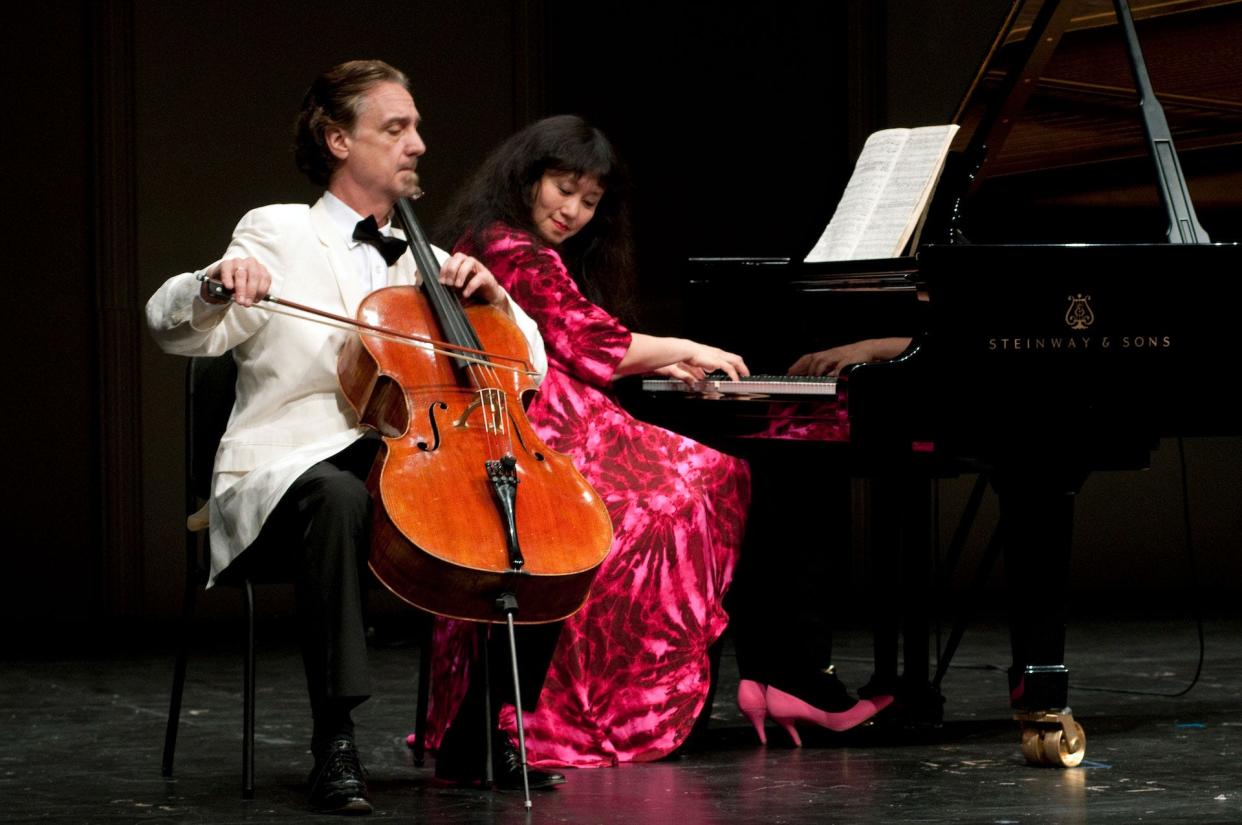Four Arts to host three-concert series of Beethoven chamber music

- Oops!Something went wrong.Please try again later.
- Oops!Something went wrong.Please try again later.
- Oops!Something went wrong.Please try again later.
- Oops!Something went wrong.Please try again later.
With even his stern face and wild artist's hair as iconic as his music, it’s not easy to remember that Ludwig van Beethoven was once a struggling up-and-comer.
But at the end of the 18th century and the beginning of the 19th, the young German piano virtuoso and promising composer quickly made a name for himself in his adopted city of Vienna, which at that time was the leading European city for music.
Beethoven built the first part of his career on music for the piano, writing bold new takes on the sonata form, but also in chamber music, a form that his predecessors Franz Joseph Haydn and Wolfgang Amadeus Mozart had first turned into a genre for profound expression.
That chamber music legacy will be examined starting Sunday with three concerts devoted primarily to the music of Beethoven at the Society of the Four Arts. The festival, a follow-up to last season’s Schubert Festival, was organized by the Four Arts artistic adviser, pianist Wu Han. She and her husband, cellist David Finckel, have been the artistic directors of the Chamber Music Society of Lincoln Center for the past 20 years. Finckel is best known for his long tenure with the Emerson String Quartet, which retired from performing last year.
The concerts begin Sunday with Wu Han and Finckel playing all five of the cello sonatas of Beethoven. These works, which are the first major works in this form by any composer, span the breadth of Beethoven’s career from 1796 to 1815 and have become staples of the cello repertoire. The Sonata No. 3, which dates to 1808, is described in Finckel’s program note as “one of the greatest works in the cello literature.”
“The new prominence of the cello, the sweeping use of the instrument’s range, and the long, singing lines all herald the full flowering of the cello’s role in the duo sonata,” Finckel writes.
Performing all five of the cello sonatas in one program is something of an Olympic-style event, and it offers listeners a chance to hear how Beethoven made something special out of the form even as his style grew radically more progressive with the passing years. The sonatas will be performed at 3 p.m. Sunday in the Gubelmann Auditorium at the society, the site of all three concerts.
The second concert, set for Jan. 10, features works for piano trio, which is the term for a work composed for piano, violin and cello. Haydn wrote a number of standout piano trios, and it was to his model that Beethoven looked for his own set of three piano trios, which were published as his Op. 1 in 1795.
Wu Han and Finckel will be joined for this concert by violinist Arnaud Sussmann, who leads the Chamber Music Society of Palm Beach. The program includes two piano trios by Beethoven and two by Haydn, with whom Beethoven studied for a short time after coming to Vienna.
The Beethoven works are his Piano Trio in C minor (Op. 1, No. 3), which Haydn famously advised Beethoven not to publish because of its novelty, and the so-called “Ghost” Trio (Op. 70, No. 1) of 1808, which earned its nickname from the unsettled, minor-key music of the second movement and is considered a transformational work in the piano trio form.
The program also contains two late piano trios by Haydn, No. 18 (in A), and No. 28 (in E). Both were written as a result of Haydn’s second trip to London in 1794-95, where he was much admired, and for whose public he also wrote the last of his 100-plus symphonies. The trios will be heard at 7:30 p.m. Jan. 10.
The final festival concert, on Sunday, Jan. 14, brings in other instruments Beethoven used in his chamber music. The Clarinet Trio (Op. 11) features clarinetist Tommaso Lonquinch, accompanied by Wu Han and Finckel. One of Beethoven’s string trios (Op. 9, No. 2) is next, with violinist Richard Lin, violist Aaron Boyd and cellist Jonathan Swensen.
The concert concludes with Beethoven’s Septet for winds and strings (Op. 20), which was one of the composer’s most popular pieces in his lifetime, beginning with its premiere in 1800. A big, genial crowd-pleaser of a piece, Beethoven later in his life tended to slight it, no doubt wishing that his more progressive works would have won similar acclaim. But the Septet offers an excellent example of how the composer treated the different categories of sound available to him from strings and winds, and it remains and engaging and charming work.
The Septet will be played by Lin, Boyd, Swensen and Lonquich, along with hornist David Byrd-Marrow, bassoonist Marc Goldberg and bassist Timothy Cobb. The concert is set for 3 p.m. Sunday, Jan. 14.
For more information about the festival, call the Four Arts box office at 561-655-7226, or visit fourarts.org.
This article originally appeared on Palm Beach Post: Three-concert series at at Four Arts puts focus on Beethoven

